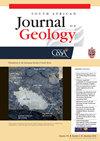Lithostratigraphy of the Bumbeni Complex and its associated subdivisions, South Africa
IF 1.2
4区 地球科学
Q2 GEOLOGY
引用次数: 1
Abstract
The Bumbeni Complex represents an Early Cretaceous volcanic complex that developed at the southern termination of the Lebombo mountain range in northern KwaZulu-Natal, South Africa. The volcano-sedimentary complex intrudes and disconformably overlies the Lebombo Group of the Karoo Large Igneous Province. The volcano-stratigraphy is defined by an assemblage of volcanic and volcaniclastic rocks as well as late stage quartz-syenite intrusions. Based on current geological and geophysical studies the complex is considered to represent the remnants of a collapsed cauldron structure. The stratigraphic succession is intricate and laterally discontinuous, comprising mafic and felsic lava flows, welded and non-welded tuffs, ignimbrites, lahar deposits, rhyolite domes and dykes and coarse-grained syenitic rocks. Rhyolite dome formation and collapse, and associated plinian eruptions and column collapse, were largely responsible for the variety of volcaniclastic rocks, including classic air-fall tuff deposits. The complex forms part of a northeast trending volcanic basement lineament known as the Bumbeni Ridge defined by aeromagnetic data.南非Bumbeni杂岩及其相关分区的岩石地层学
Bumbeni复合体代表了一个早白垩世的火山复合体,它发育在南非夸祖鲁-纳塔尔省北部Lebombo山脉的南端。火山-沉积杂岩体侵入并不整合覆于卡鲁大火成岩省的Lebombo群上。火山地层由火山和火山碎屑岩组合以及晚期石英正长岩侵入体确定。根据目前的地质和地球物理研究,该复合体被认为是一个坍塌的大锅结构的残余。地层演替复杂,横向不连续,由基性和长英质熔岩流、焊接和非焊接凝灰岩、火成岩、泥凝岩、流纹岩穹状岩和脉状岩以及粗粒正长岩组成。流纹岩穹丘的形成和崩塌,以及相关的普林尼火山喷发和柱状崩塌,在很大程度上造成了各种各样的火山碎屑岩,包括经典的空气沉降凝灰岩矿床。这个复杂的构造是一个东北走向的火山基底线的一部分,被称为本贝尼脊,由航磁数据定义。
本文章由计算机程序翻译,如有差异,请以英文原文为准。
求助全文
约1分钟内获得全文
求助全文
来源期刊
CiteScore
3.60
自引率
5.60%
发文量
18
审稿时长
>12 weeks
期刊介绍:
The South African Journal of Geology publishes scientific papers, notes, stratigraphic descriptions and discussions in the broadly defined fields of geoscience that are related directly or indirectly to the geology of Africa. Contributions relevant to former supercontinental entities such as Gondwana and Rodinia are also welcome as are topical studies on any geoscience-related discipline. Review papers are welcome as long as they represent original, new syntheses. Special issues are also encouraged but terms for these must be negotiated with the Editors.

 求助内容:
求助内容: 应助结果提醒方式:
应助结果提醒方式:


